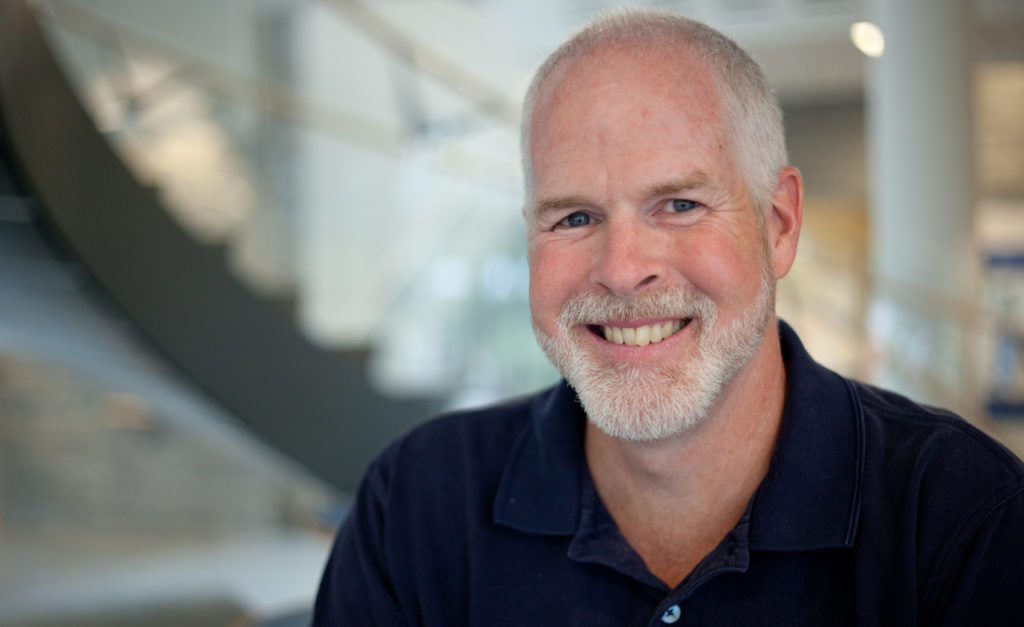Prof. Edmund Durfee retires after a 33-year career in artificial intelligence at Michigan

Prof. Edmund H. Durfee will retire at the end of June, after 33 years at the University of Michigan, from a career that has been distinguished by his contributions to the artificial intelligence research community, his dedication as a teacher and mentor, and his service to U-M’s CSE undergraduate programs.
Colleagues and former students invariably describe Prof. Durfee as calm, composed, thoughtful, and collegial. He’s also known to be highly collaborative and to pay close attention to detail. For these reasons, it is perhaps unsurprising that his research has been centered on cooperative artificial intelligence agents.
Specifically, his research has focused on artificial intelligence mechanisms for coordinating the activities of sophisticated, autonomous computational agents that adapt their behaviors to achieve individual and collective objectives in complex, time-critical environments. He has pioneered distributed planning and constraint satisfaction techniques for safe cooperation in teams of agents (and often also humans), and has led NSF and DoD projects employing these techniques in applications including cooperative reconnaissance by unmanned vehicles, organizational self-design for disaster response, coordinating distributed human teams, military coalition coordination, interoperation in digital libraries, and delegating command and control tasks to computational agents in reduced-crew-size ships. In addition, from 2013-2020, he was co-director of the U-M Rehabilitation Engineering Research Center, funded by the U.S. Department of Health and Human Services National Institute on Disability, Independent Living, and Rehabilitation Research, exploring how technology, including artificial intelligence, can be used to support and reinforce healthful behaviors as disabled youth transition to independence. The tools developed through the center were released as open source software in 2020.
Prof. Durfee served as director of the Artificial Intelligence Laboratory from 1999-2001, and as director of the U-M Robotics and Autonomous Vehicles master’s degree program, a precursor to the current graduate programs in Robotics, from 2010–2016. But his principal service activities at U-M have revolved around the undergraduate CS programs. He received College and Departmental awards for spearheading sweeping improvements to these programs in 2000, including the creation of the CS program in the College of Engineering. He later spent nearly a decade as Chief Program Advisor for the CS program in LSA before returning to chairing the CS Program committee in recent years. He has taught most of the core CS courses (EECS 183, 203, 280, and 281), but his predominant contribution in the classroom has been to teach introductory artificial intelligence (EECS 492/592) nearly every year since 1988.
Prof. Durfee has supervised 22 completed doctorates, as well as numerous research projects involving masters and undergraduate students. Many of his former doctoral students are now distinguished professors themselves, and others have made important contributions to AI concepts and practice in corporate and government laboratories. The impact of his mentorship on these students is perhaps best expressed by his former doctoral students themselves.
One former student said, “I’ve always appreciated Ed’s soft-spoken deep thinking, and I remember finally realizing just how much work was involved with his edits to my papers. It’s actually taken me years to unpack all of that advice and realize how powerful that mentorship was. Now, with my own students, I find myself telling them things that Ed told me years before.”
Another remarked, “I didn’t end up in academia, but so much of what I learned from Ed has been applicable to where I am, which is Google. It’s a way of systematically approaching research problems that carries over to the engineering context.”
Prof. Durfee received his A.B. (1980) in chemistry and physics from Harvard University, his M.S. (1984) in electrical and computer engineering and Ph.D. (1987) in computer and information science from the University of Massachusetts. He completed a postdoctoral appointment (1987-88) at the University of Massachusetts and joined the CSE faculty at the University of Michigan faculty as an Assistant Professor in 1988, becoming an Associate Professor in 1994, and a Full Professor in 2000. He held a joint appointment in the School of Information for many years, and also held visiting positions at Hebrew University in Israel (1995), and the University of Fort Hare in South Africa (2002).
He was an associate editor for the Journal of Artificial Intelligence Research, the International Journal on Autonomous Agents and Multi-Agent Systems, and IEEE Transactions on Systems, Man, and Cybernetics, and served terms as President and as Treasurer of the International Foundation for Autonomous Agents and Multi-Agent Systems (IFAAMAS). He served multiple times as Conference co-Chair and Program co-Chair for the leading conference in his field. He is a fellow of the Institute of Electrical and Electronics Engineers (IEEE) and the Association for the Advancement of Artificial Intelligence (AAAI).
Prof. Durfee received a Presidential Young Investigator award in 1991, and was the first two-time recipient of the IFAAMAS Influential Paper Award, in 2008 and 2010. He has been recognized by the EECS Department with awards for research excellence and outstanding achievement, in 1996 and 2001, and by the College of Engineering for service excellence in 2002 and with the Ted Kennedy Family Faculty Team Excellence award in 2020. He received an Outstanding Achievement in Research Alumni Award from the University of Massachusetts Computer Science Department in 2012.

 MENU
MENU 
